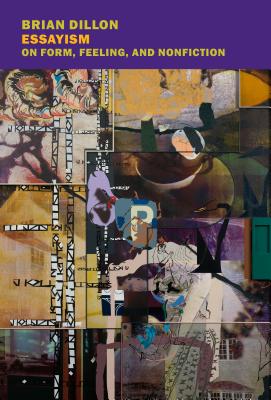Essayism: On Form, Feeling, and Nonfiction

Essayism: On Form, Feeling, and Nonfiction
A compelling ode to the essay form and the great essaysists themselves, from Montaigne to Woolf to Sontag. Essayism is a book about essays and essayists, a study of melancholy and depression, a love letter to belle-lettrists, and an account of the indispensable lifelines of reading and writing. Brian Dillon's style incorporates diverse features of the essay. By turns agglomerative, associative, digressive, curious, passionate, and dispassionate, his is a branching book of possibilities, seeking consolation and direction from Michel de Montaigne, Virginia Woolf, Roland Barthes, Theodor Adorno, Walter Benjamin, Georges Perec, Elizabeth Hardwick, and Susan Sontag, to name just a few of his influences. Whether he is writing on origins, aphorisms, coherence, vulnerability, anxiety, or a number of other subjects, his command of language, his erudition, and his own personal history serve not so much to illuminate or magnify the subject as to discover it anew through a kaleidoscopic alignment of attention, thought, and feeling, a dazzling and momentary suspension of disparate elements, again and again.
PRP: 117.49 Lei
Acesta este Pretul Recomandat de Producator. Pretul de vanzare al produsului este afisat mai jos.
105.74Lei
105.74Lei
117.49 LeiLivrare in 2-4 saptamani
Descrierea produsului
A compelling ode to the essay form and the great essaysists themselves, from Montaigne to Woolf to Sontag. Essayism is a book about essays and essayists, a study of melancholy and depression, a love letter to belle-lettrists, and an account of the indispensable lifelines of reading and writing. Brian Dillon's style incorporates diverse features of the essay. By turns agglomerative, associative, digressive, curious, passionate, and dispassionate, his is a branching book of possibilities, seeking consolation and direction from Michel de Montaigne, Virginia Woolf, Roland Barthes, Theodor Adorno, Walter Benjamin, Georges Perec, Elizabeth Hardwick, and Susan Sontag, to name just a few of his influences. Whether he is writing on origins, aphorisms, coherence, vulnerability, anxiety, or a number of other subjects, his command of language, his erudition, and his own personal history serve not so much to illuminate or magnify the subject as to discover it anew through a kaleidoscopic alignment of attention, thought, and feeling, a dazzling and momentary suspension of disparate elements, again and again.
Detaliile produsului








